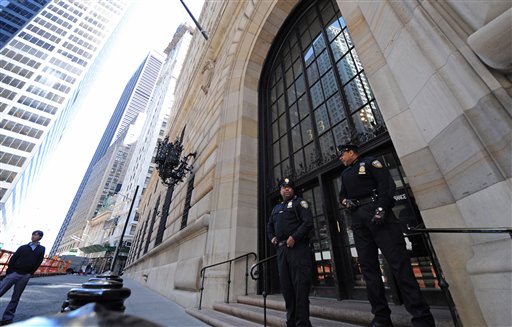A man from Bangladesh, accused of trying to blow up the Federal Reserve Bank with what he thought was a one thousand pound car bomb, pleaded guilty to terrorism charges early last week.
Quazi Mohammad Rezwanul Ahsan Nafis, 21, was arrested on Oct. 17 after pulling up to the Federal Reserve and attempting to detonate what he thought to be a one thousand pound bomb hidden in a van. In its place, he was actually carrying materials planted by an undercover FBI agent as part of a sting operation.
“I had intensions to commit a violent jihadist act,” Nafis told the judge. Nafis also displayed his shift in jihad participation, saying at the hearing, “I no longer support violent jihad. I deeply regret my involvement in this case.”
On May 30, the 21-year-old will face a possible life term at sentencing. Investigators said in court papers that Nafis came to the U.S. committed to jihad and worked out the details of a plot when he arrived. He then selected his target, drove a van loaded with imitation explosives to the door of the Federal Reserve and tried to set off the bomb from a hotel room using a cellphone he thought had been rigged as a detonator. Nafis also stated that he had the approval of al-Qaida and was acting on behalf of it, but he has no known connection to the terrorist group, according to federal officials.
During the investigation, Nafis spoke about his deep admiration for Osama bin Laden, talked of writing an article about his plot for an al-Qaida-affiliated magazine and said he would willingly be a martyr but preferred to go home to his family after finishing the attack.
However, Nafis’ family members in Dhaka say they do not believe he was capable of these actions.
“My son couldn’t have done it,” Quazi Ahsanullah said after news of his son’s arrest. Nafis, who was working as a busboy at a restaurant in Manhattan at the time of the arrest, came to the U.S. as a student. According to his parents, he did very poorly at school in Bangladesh and was able to persuade them to send him to study in the U.S. as a way of improving his job prospects. They don’t believe he was planning an attack.
According to unsealed criminal complaints filed in Oct., Nafis entered the United States in 2012 with a student visa, and eventually traveled to Queens, New York. Once in Queens, he searched for targets for a potential attack – including the New York Stock Exchange and President Barack Obama. He eventually settled on the Federal Reserve Bank in Manhattan.
Nafis also attempted to recruit others to aid in his plan, and discussed his plots over social media sites such as Facebook. He claimed he was interacting with al-Qaida operatives overseas and actively sought out new al-Qaida connections in the United States.
One of the individuals he brought into his plan was an undercover agent working for the FBI, who monitored Nafis’ activities and helped arm him with the inoperable explosives according to authorities.
Prosecutors also said Nafis tried to use a mobile phone to detonate the explosives that were concealed in a van. After Nafis repeatedly tried and failed to ignite the explosives, he was arrested.
U.S. Attorney Loretta lynch spoke of Nafis’ plan, saying, “As today’s guilty plea shows, the defendant came to this country not to further his studies, but to advance the goal of jihad. With diligence and determination, Nafis attempted to carry out his plan in the name of al-Qaida.”
The Federal Reserve Bank in Manhattan is one of 12 branches around the country that make up the Federal Reserve System that serves as the main bank of the United States. It is one of the most architecturally stunning buildings in the city and is in the middle of a massive security effort headed by the New York Police Department where a network of thousands of private cameras watch for suspicious activity.
Junior Erica Crespo gave her input on the frightening prospect of an attack, “It’s scary because it’s something that’s not only going to affect that place but everything and everyone around it. Since we’re so close here at Pace it can also really negatively impact us. It’s just like the Twin Towers when we lost a lot of people from our school. The fact that he didn’t think about others is disturbing.”
Following the hearing, Nafis’ lawyer, Heidi Cesare, said he “pleaded guilty because he is guilty, and wants to take responsibility for that.” She also said that under the plea agreement his sentencing range between 30 years and life.

